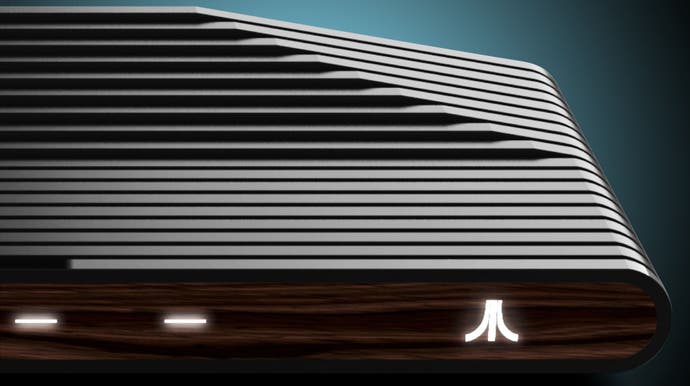"People want a lot of answers"
We interview Atari as it re-reveals its console / computer hybrid.
Not content with making a hat with a speaker in it, Atari is back with a new home console.
We've known about this for a little while now, when it was first revealed as the Ataribox, before being recently re-revealed as the VCS. It's designed as a throwback to the company's origins of making 'Video Computer Systems' such as the Atari 2600, all the way to the design of the system itself - from ribbed lines to the option of a wooden finish.
It was an unusual time to sit down with COO of Atari Connected Devices Michael Arzt at this year's Game Developer Conference, with its crowdfunding campaign on hold after pausing in December and many other specifics still undecided.
Rich from Digital Foundry called the device a "hard sell" when evaluating the system last year, and though Arzt had plenty to say, our conversation admittedly did little to change my mind.
There was, however, some clarification of what the VCS will be. Is it a retro box like the NES mini? No - though it will play classic games.
Nor is it a closed system like a PlayStation or Xbox, thanks to a Linux sandbox mode. It lets you to stream music, browse the internet and check email like you would with a PC, except you can hook it up to your TV. But it will have a console-style frontend and a store, with plans to resurrect its huge roster of classic properties.
I wanted to find out Atari's ambitions for the VCS, where it sits alongside PCs, mobiles and consoles, and why, in Arzt's words, "it's so important to us that we get this right" after such a long time from the hardware space.
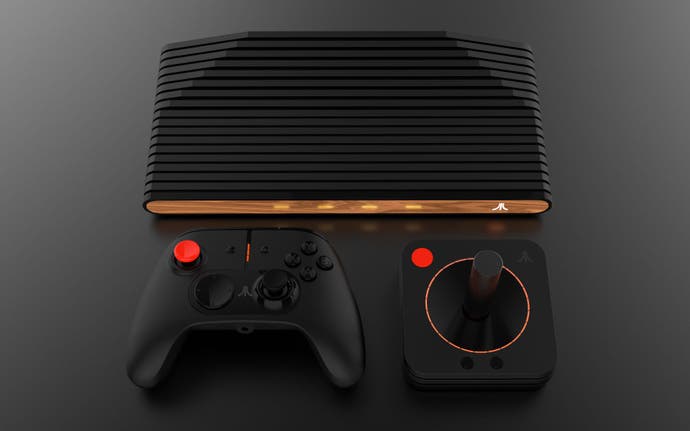
Who's the target audience for the VCS?
Michael Arzt: It's interesting. The target audience is two mind sets and two groups. If you think about the broad Atari audience - we're obviously targeting the Atari audience, right? - but the Atari audience you can really draw a pretty solid line down right around age 35, so everyone over age 35 remembers us one way - they grew up with us, played the old consoles like the 2600 or played in the arcades and all that, and they have a certain nostalgic recollection and feeling for the brand. That's one group, and there's things on this for them.
But all the modern stuff, which will also appeal to them as well - they watch Netflix, listen to music, all that stuff - but then the other idea is all these things we're doing now, everyone under the age of 35, they think of Atari a different way. They will buy the faded T-shirt - the hipster dude down in Soho or whatever, right? - they think about Atari as this cool, old brand like so many other cool old brands, but they're the ones buying [retro-styled things like] Mini Coopers. So we're going to create something that's got things for them.
What do they care about from an entertainment standpoint? They care about games, of course, they care about Hulu and Netflix, and Spotify and Pandora, they care about social media, they care about communication and chat, so all that stuff will be there for them as well, so this will be a product that will appeal to that audience. [This will be] giving them a device that will let them do all that stuff they care about on their TV, is hopefully something that will be appealing to them.
There's other things we're not in a position to talk about yet that this will do, that will I think enhance some of what I'm telling you even greater.
What makes it competitive? There's PCs, there's phones, which have all these features as well.
Michael Arzt: It's less expensive than a PC, and it doesn't require you to have your laptop plugged into the TV. It'll control many aspects of the TV, and it'll also let you do things on the TV that - because it'll have voice control, because it'll have a really easy navigation system, things like that - it'll make computing on the television easier.
You'll be able to hook a wireless or USB mouse and keyboard to it, if you want it to - it'll do all that stuff. It's an open platform like any PC. The controllers are Bluetooth, and will work with any PC. This [VCS] controller is essentially a modern Xbox-style controller. Somebody who doesn't have the box could still buy one of these and use it with their Android or their PC.
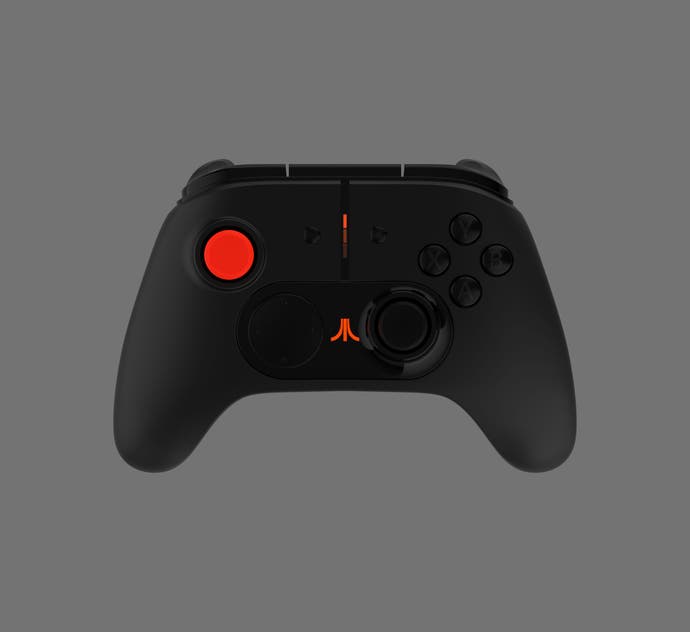
So they could wirelessly connect their Xbox or PlayStation controller to this? Any Bluebooth controller?
Michael Arzt: Yeah, any Bluebooth or USB controller will work. We just got this thing [the VCS controller] in - but they're using Xbox 360 controllers to test it and play games in the engineering lab. It's very much a PC from that standpoint, and interchangeability with other products and other peripherals will be easy.
What is the price point you're looking at?
Michael Arzt: We've been talking about a price point of $249 to $299 [£173 to £208] - we're always hoping we can do better. I'd rather under promise and over deliver, but right now, we're pretty confident we can hit that price. Configurations and bundles can change things a little bit - what we put on in terms of games that come with it, if we did a deluxe bundle, that would add price. Because [the controller] alone is $39, $49 [£34] right?
Yeah, controllers aren't cheap.
Michael Arzt: Yeah - well, a good one isn't, and we want it to be a good one, that's important for us. So we're working with a peripheral partner that makes good stuff, and we're really excited about that, and we'll announce them when we're a little bit further down the line.
And that's really what it is - a lot of what we're facing right now is - people want a lot of answers. We feel strongly - and I certainly feel strongly as the guy who has to manage this - I feel it's very important that we speak when we actually have something to say. It's really easy to get sucked into that vortex of responding to things on social media, or responding to tough questions from guys like you, but it's so important to us that we get this right, because we have such a heritage and a responsibility to our fans to get this right.
To promise something and not be able to deliver is way worse than holding back on sharing, and hopefully we'll be pleasantly surprising people in the end. To me, I always like to operate from a position of integrity. We care about this about this thing as much as you do.
We know how important it is for this thing to be right. It's important to us, because we work with Atari, but also because we grew up with the brand too - we care that this new Atari is doing things the right way, and avoiding mistakes as often as possible.
It's still a company run by men and women, right - so there will be mistakes, humans make mistakes - but ultimately it's about delivering something we can all feel good about, and most importantly, something the fans will be excited about. So that's where we're at.
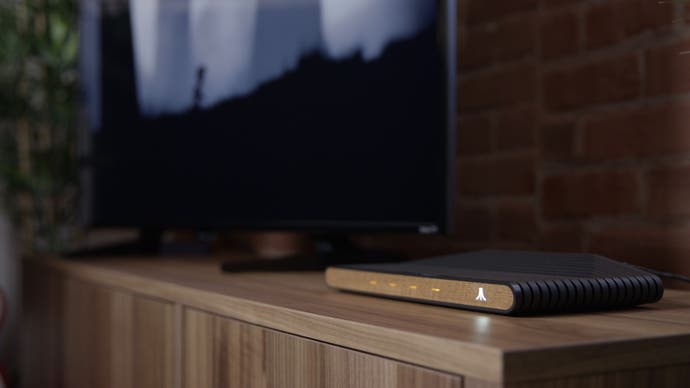
On the other hand, why show this hardware now, without having those details?
Michael Arzt: Because this is an important milestone, especially after we hit the pause button in December. The first few people said, 'Vapourware' and so on. We felt it was really important [to show we were] continuing to work on it now we've got many more pieces in place since then. The pause was a really valuable thing for us, because we were able to fix the one thing that was the show stopper, which was quite frankly was, the controller.
We did not like the controller we had before, we did not like the partner we were working with, we did not like the business plan, we did not like the design. It did not fit with the other stuff. That was the thing that ultimately paused it there, but it was a great opportunity to [say] hey, we're paused now, we'll take a breath, let's do a top-to-bottom audit of everything else, right? There were things that were good, but we felt like if we do this to it, it'll be even better. Timing wise, we realised we're going forward with this, but it's not baked yet, so let's bake it so more.
The point we made with coming to GDC was - we felt this was an important event for the industry, this is an event where we're going to be talking about games and things, we're going to be talking to development partners and people we want to help us put great products and great games on the box. It's a good time to re-enter the conversation with people and put it out there for people to see, give them the official name, and let them see - look, they are engineering models [here], but there are real ones working.
They're coming, they're real, people can touch them, and we felt it was really important to give them that opportunity - through the eyes of the press, obviously. We're not out on the [show] floor. We're going to continue to put information out as it's ready, and we'll speak when we have something to say. Hopefully a couple of months from now when we're at E3, we will have a lot more to talk about - when a lot more deals have been done, and a lot more things have been locked down.
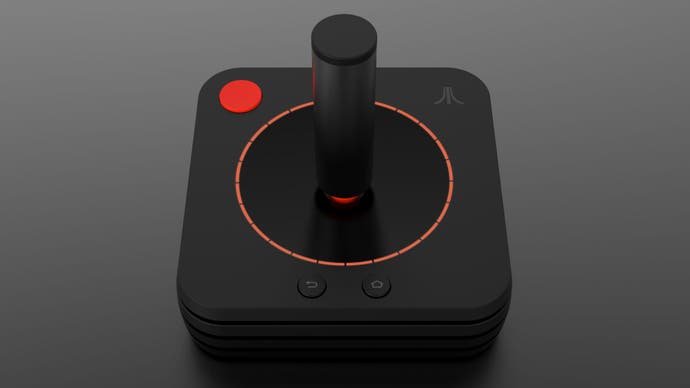
And hopefully, we're able to put some playable stuff out there. But there's a lot of work to do! It's just how it is. None of what I'm talking about is promises, it's hopefully this, hopefully that - but best intentions are there. As I said, we care about how fans perceive us, and look, it's the internet right - people are going to hate, people are going to spew nonsense, and it's fine. I'm glad there's debate. I'd rather have people talk about us, good or bad, because it shows they care! That's a good sign for us.
I suppose the worst thing you could have is announce or release something and it goes into the void, right?
Michael Arzt: Yeah, exactly. Look, we're working for Atari, working on Atari products. There's a burden to bear there. We'll all readily admit there are things we have done that if we could do it differently, we would. Pausing in December, I would do it again - because we are now sitting here, four months later, with a much better handle on a lot of elements on what makes this product - and will make this product - great.
But like with any complex project, you learn things as you go, you make decisions, you make changes, you refine, you adjust.
So you guys are now taking your time and you're allowing yourselves time to pause. What are the next steps, and when are you going to talk more?
Michael Arzt: We've announced we're going to say more about the product and about our first pre-order programme... we will announce it by the end of April. But I can't say today what we're going to announce exactly, but we're going to make an announcement about pre-orders and more details on the project and the box.
Does that mean you're no longer crowdfunding this?
Michael Arzt: I didn't say that! But the thing to understand about our approach to crowdfunding is that - it's not really so much crowdfunding as it is... there's a lot of ways to use crowdfunding. We're looking at this as an opportunity. It's about fan service, and it's about community. Taking a crowdfunding approach - the very first one, it's this wooden [box], it's going to be special, it's going to be about catering to our biggest, most nostalgic fans, and giving them an opportunity to give us feedback on this as we're building it, before it's too late and are locked and baked. And there's a lot of things we're not sure about that the crowdfunding process will give us an opportunity to do.
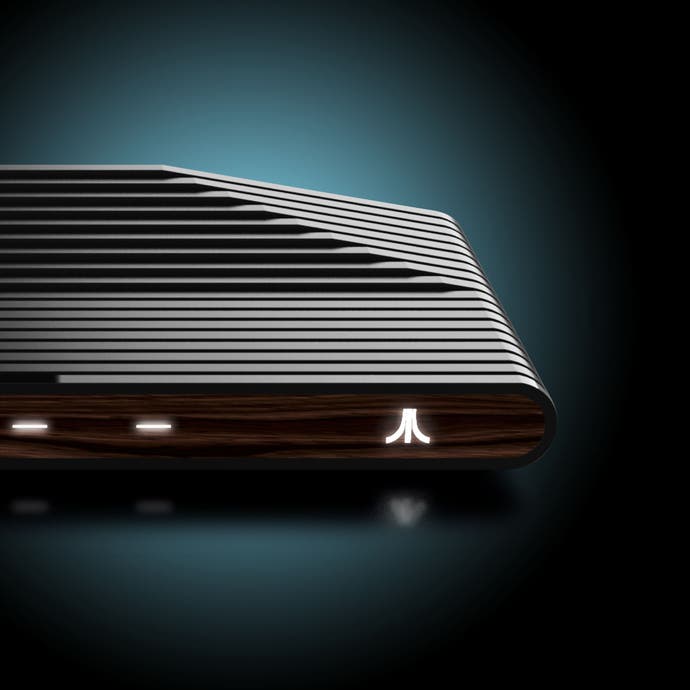
But it will also tell us if we have something - all this chatter, news and excitement, if people are willing to start pre-ordering it, that will tell us a lot, right? It's moving forward - we could cancel the crowdfunding idea and still be moving forward, but right now we think it can benefit us.
We are not Microsoft or Sony, where we have the same kind of research capabilities and previous products that have been around for years. This is, in a lot of ways, a greenfield project, where we're starting from scratch. Having that engagement with the community and the fans is going to be super valuable to answering the questions that we still have about it.
We've got a lot of research that we've done, and a lot of calculated hunches that we've put forward in the way we're thinking about it, but the fans will tell us if those things are making sense or not. That's really, for this project - I can't speak to all crowdfunding [campaigns] - but that's what we want this one to do for us, to give us a dialogue with fans. And yeah, it's partly a proof of concept, but ultimately, what are we building? The guts of it - to be candid - it's a good laptop that has no keyboard and no screen. What we're doing with the software, and we're doing with the other stuff, that's the special stuff that Atari brings to it, but it's an attractive piece of consumer electronics that structurally is kinda straightforward.
It's an AMD, x86 processor, it's a hard-drive, it has an Ethernet support and USB - it's a little computer, and people make computers all the time. The hardware part of it is the easy part. Now it's baking in the software and making it a unique experience. That's the part we're really rolling up our sleeves and working on right now.
What about long term support? When you buy a console from Microsoft, Sony or Nintendo, you're buying a system that you know will last say four, five, six years with exclusive titles...
Michael Arzt: That's what we want too - to build something that's one and done makes no sense. A lot of things that we're trying to do are things that will, like I say, make it appealing to that younger audience and give it that life span. I'd love to be back here with you in five years talking about VCS 2 - that would be awesome. And if we do our job right, that could be happening. There's other things we could creatively with this design - do different colours and editions, things like that, which we'd love to do also. But you know, you've got to start somewhere.
Are you looking to be on that same stage as, say, a PS4? I think the perception until now is this is a NES mini, or similar.
Michael Arzt: No - that's a retro box. There's retro boxes, and there's retro-inspired. I go to a Mini Cooper analogy - that car is not retro, it's retro-inspired. That's how we look at this device. It's a modern device that's retro-inspired. The current Mini Cooper will do everything the old Mini Cooper did. This will do anything the old 2600 or 5200 did, but it also does a lot of modern things very well, if we do it right.
So when it comes to games, Atari not only has those generations, but you also have the likes of the Jaguar. Is that something you're interested in?
Michael Arzt: We're looking at everything from our history. Will it all be available from day one? No, that would be a monumental undertaking. Even the Xbox versions and PlayStation versions of Flashback [a compilation of classic Atari games], we parse them out in chunks, right? Those Flashbacks, they have some of the arcade stuff, they have some of the console stuff, they mix it up. I would think that's how we approach the classic catalogue. But by the same token, we're very excited about games like Tempest 4000, which is a completely re-imagined take on Tempest.
We want more of those to be made, whether we're making them, or we're working with independent studios for them to develop. We've got over 200 different pieces of IP [intellectual property] that are all available to be re-imagined. We're working on some of them, but there's a whole lot that we will do very favourable deals with independent studios and smaller studios, to give them an opportunity.
Just like I was talking about community, that includes indie developers; they're fighting for share of voice and creating great content that doesn't get seen because they can't compete against Call of Duty, Assassin's Creed or some of these triple-A games that are appearing on bespoke platforms. So when we talk about community it means a lot - it means the fans, the developers, the industry, it means... an open source box that allows for creativity, but that also has proprietary stuff as well.
I could keep asking questions about the VCS, but I don't know how much you can openly answer right now. Like for example, third parties...
Michael Arzt: Yeah! We're talking with third-party publishers, and giving them the opportunity to... if some of them already have things that already run on Linux. Great - port them over, we'll give you a really favourable deal if you put them in our store. We're having those conversations. We're also saying, are you interested in taking a stab at one of our classic IPs?
Normally, and for the mega big classics like an Asteroids or a Centipede, those kind of [games] we'll typically do a licensing deal where there's an upfront payment - but for the vast majority of our titles? Someone could come to us and say 'I have an idea for Air Sea Battle', which is a seminal game, but Air Sea Battle can be anything - it doesn't have to be a literal remake of the game with modern graphics.
The idea of indies pitching to make their favourite games of the past to re-imagine is a great idea. Is this an open call, or are these more behind the scenes deals?
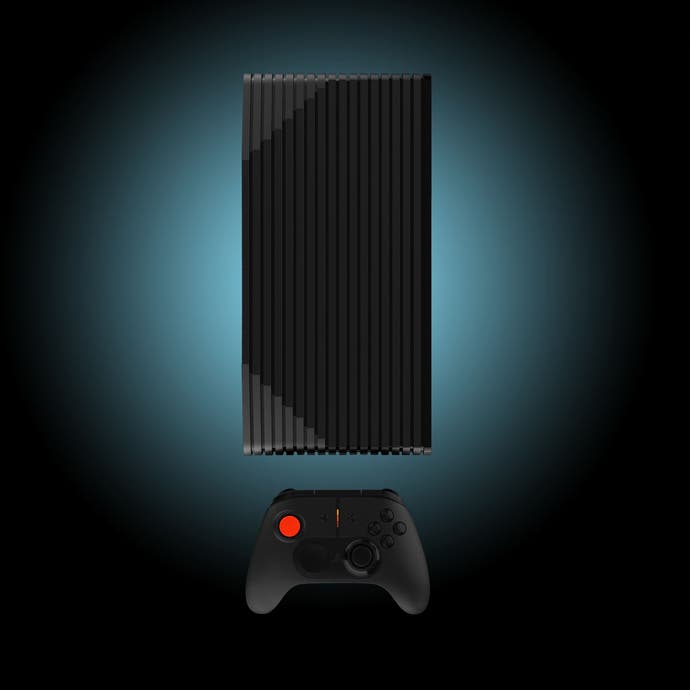
Michael Arzt: We've got members of the bizdev team that have been out there all week [at the Game Developers Conference] talking to people, and a lot of them are intrigued. The bigger ones tend to be more inclined to take the wait and see attitude - let's see what your audience looks like, lets see if it's worth porting our stuff to Linux - and so on. But the smaller guys, who see it as an opportunity to get their name on the map? [They're] going to be the ones that might bite. We invite everybody, and we'd love to talk to everybody, and there's nobody we wouldn't talk to.
The game part of it is exciting, but... every aspect of what needs to be done is just manual labour. It's time, it's people talking to people doing work, cutting deals and all of that stuff. There's a bunch of people we're talking to on the investment side that can impact different things, such as where it's sold, how it's sold, that kind of stuff. That's all out there too. I would say, box or no box, it's a good time to be Atari because nostalgia is very popular right now.
But the fact we have some cool products to talk to people about, great games that we're doing. We've got a lot going on, we're got a lot more to come. What I know is coming in the next 18 months is pretty impressive, so we're excited and glad to be back as Atari fans ourselves - as I say, we all grew up with it. Everybody wants to be part of bringing Atari back, and bringing it back in the right way - with as few mistakes as possible!
